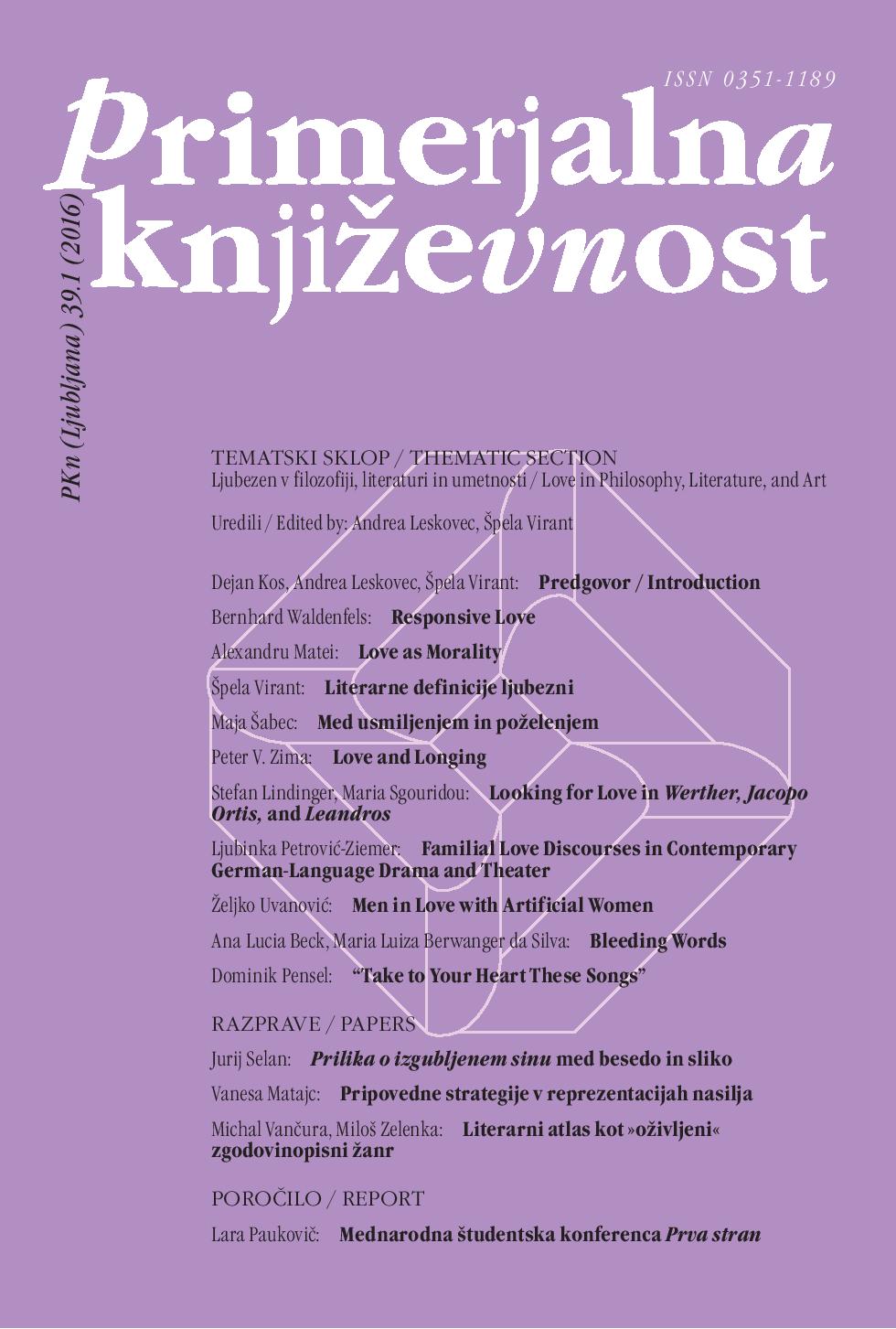Literary Definitions of Love
Keywords:
German literature, English literature, literary discourse, love, definitionAbstract
In the literature of modern age western societies it is possible to find a great number of definitions of love. These fictional definitions imitate a rational, scientific approach to the question, what love is. They emulate the structure of scientific definitions (definiendum, copulative verb, definiens), but they do not observe love from a distanced, objective point of view as it is necessary for a scientific understanding of the object. The article gives examples of fictional definitions of love from English and German lyrics and novels, including poems by Andrew Marvell, William Shakespeare, Erich Fried, and novels by Erich Kästner, Heinz Helle, Thomas Hettche and Paul Auster. The analysis of the chosen passages shows that fictional definitions use a kind of double perspective, observing and describing love from the distance and from the personal experience of being in love at the same time. They use variations of the common structure of definitions (for example circular definitions), irony, proliferation of the definiens, and contextualization of the definition in the narratives. Some of these textual strategies can be traced back to the Bible and to Plato’s Symposium and Timaeus. In this way it becomes obvious that fictional definitions of love do not refer only to the modern scientific discourse, but also to the basic texts of European philosophical and religious thought. In opposition to scientific definitions they enhance the ambiguity of the word love and subvert the dualistic thinking that strictly separates reason from emotion. The reader cannot get the definite answer to the question, what love is, only the idea, what love might be, and the possibility to relate to experiences other people made with it.References
Abraham, Lyndy. Marvell and Alchemy. Aldershot: Scolar Press, 1990.
Aristoteles. Poetika. Prev. Kajetan Gantar. Ljubljana: Cankarjeva založba, 1982.
Auster, Paul. Moon Palace. London: Faber and Faber, 2004.
Blades, John. Shakespeare: The Sonnets. Houndmills in New York: Palgrave Macmillan, 2007.
Davison, Dennis. The Poetry of Andrew Marvell. London: Edward Arnold, 1964.
Fried, Erich. Es ist was es ist. Berlin: Wagenbach, 1983.
Freid, Erich. Ljubiti se z vse boljšim orožjem. Izbrane pesmi. Prev. Štefan Vevar. Celovec, Ljubljana in Dunaj: Mohorjeva družba, 2001.
Grafton, Anthony. Cardanos Kosmos. Berlin: Berlin Verlag, 1999.
Hanuschek, Sven. Keiner blickt dir hinter das Gesicht: das Leben Erich Kästners. München in Dunaj: C. Hanser, 1999.
Helle, Heinz. Der beruhigende Klang von explodierendem Kerosin. Berlin: Suhrkamp, 2014.
Hettche, Thomas. Woraus wir gemacht sind. Köln: Kiepenheuer und Witsch, 2006.
Hill, Christopher. »Society and Andrew Marvell, Puritanism and Revolution«. Andrew Marvell. Ur. John Carey. Harmondsworth: Penguin, 1969. 73–101.
Kästner, Erich. Fabian. München: DTV, 2011.
Kästner, Erich. Fabian. Prev. Branko Avsenak. Maribor: Založba Obzorja, 1980.
Legouis, Pierre. Andrew Marvell: Poet, Puritan, Patriot. Oxford: Clarendon Press, 1965.
Luhmann, Niklas. Ljubezen kot strast. Prev. Jure Simoniti. Ljubljana: Krtina, 2011.
Marvell, Andrew. Andrew Marvell. Oxford in New York: Oxford University Press, 1990.
Matz, Robert. The World of Shakespeare’s Sonnets. Jefferson in London: McFarland, 2008.
Platon: Zbrana dela I. Prev. Gorazd Kocijančič. Celje: Mohorjeva družba, 2006.
Schoenfeldt, Michael. »The Sonnets«. The Cambridge Companion to Shakespeare’s Poetry. Ur. Patrick Cheney. Cambridge in New York: Cambridge University Press, 2007. 125–143.
Shakespeare, William. Soneti. Prev. Janez Menart. Ljubljana: Slovenska matica, 1965.
Shakespeare, William. The Complete Works. London in Glasgow: Collins, 1990.
Šlibar, Neva: »Die Fallen der Einfachheit.« Erich Fried: Interpretationen, Kommentare, Didaktisierungen. Ur. Johann Georg Lughofer. Dunaj: Praesens Verlag, 2012. 147–154.
Winter, Eyal. Feeling Smart: Why Our Emotions Are More Rational Than We Think. New York: PublicAffairs, 2014.


